Ligand-Protein Interactions Screening Based on Gold Nanoparticles
Creative BioMart offers advanced Ligand-Protein Interactions Screening services using gold nanoparticles (AuNPs) as powerful biosensing platforms. Owing to their unique size- and distance-dependent optical properties, AuNPs provide a sensitive, versatile, and cost-effective approach to detecting biomolecular interactions. By combining ligand-coated AuNPs with luminescent water-soluble conjugated polymers, we deliver highly accurate bioassays for studying protein-ligand binding, conformational changes, and complex biological processes. Our expert team integrates nanomaterial-based assays, including colorimetric, fluorimetric (FRET/NSET), and SPR approaches, to accelerate drug discovery, biomolecular characterization, and diagnostics development with unparalleled precision and efficiency.
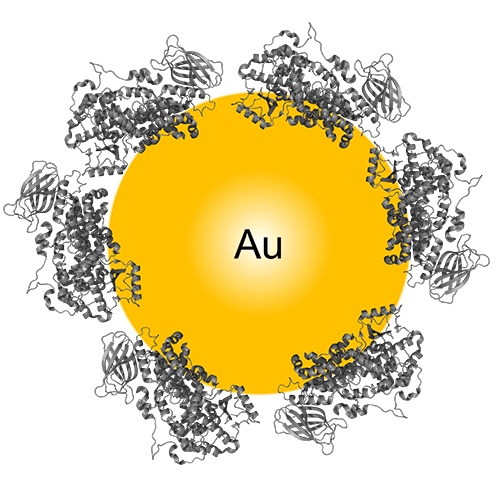
Understanding Ligand-Protein Interaction Screening with Gold Nanoparticles
Gold nanoparticles (AuNPs) have emerged as indispensable tools in biosensing and bioanalysis, largely due to their distinctive optical properties. Their extinction spectrum and solution color are highly dependent on particle size and interparticle distance, enabling rapid visual detection of biomolecular events. Aggregation-induced color changes form the basis of AuNPs’ use as colorimetric probes, while their compatibility with Forster resonance energy transfer (FRET) and nanoparticle surface energy transfer (NSET) extends their utility to fluorimetric assays.
These unique features allow AuNPs to detect a wide range of biological interactions, including DNA-DNA, protein-DNA, small molecule-DNA, and antigen-antibody binding. In addition, AuNP-based assays are exquisitely sensitive to environmental conditions, making them ideal for studying protein conformational changes induced by pH, temperature, or other stress factors.
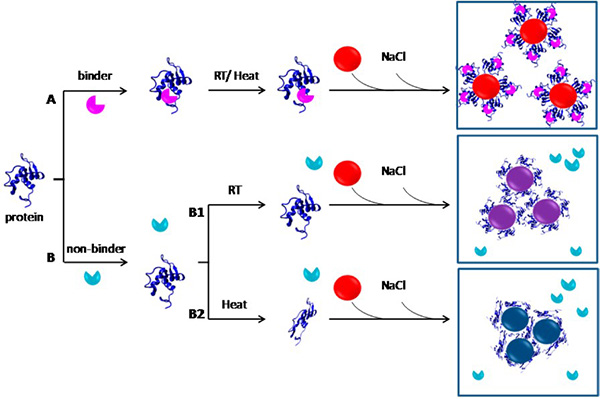
Figure 1. Schematic drawing of the AuNPs colorimetric assay principle. (New et al., 2014)
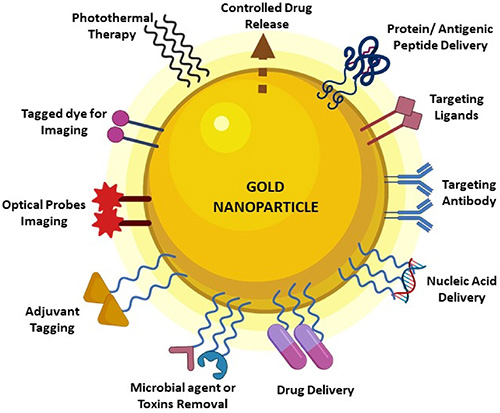
Figure 2. Schematic representation of the gold nanoparticle and its possible uses in the biomedical field. (Sengupta et al., 2022)
Gold Nanoparticle-Based Ligand-Protein Screening Services
At Creative BioMart, we provide comprehensive AuNP-based ligand-protein interaction screening services, including:
Computational Enzyme Design Services
Creative BioMart provides end-to-end computer-aided enzyme design solutions, leveraging state-of-the-art modeling tools and structural biology expertise. Our services are tailored to accelerate enzyme engineering, optimize catalytic efficiency, and support research programs focused on biocatalysis and therapeutic enzyme development. Core services in this category include:
-

Custom Ligand-Coated AuNPs
Tailored synthesis of ligand-coated gold nanoparticles designed to meet specific client research and assay requirements.
-

Conjugated Polymer Integration
Incorporation of luminescent water-soluble conjugated polymers (CPs) with AuNPs to enhance sensitivity and enable collaborative biosensing.
-

Colorimetric Assays
Detection of biomolecular interactions using AuNP aggregation-induced color changes, offering a simple and highly visual readout.
-

Fluorescence-Based Assays (FRET/NSET)
Application of FRET or NSET principles with proximal fluorophores to achieve highly sensitive ligand-protein interaction monitoring.
-

Surface Plasmon Resonance (SPR) Protocols
Advanced SPR methodologies for studying complex bio-affinity binding and quantifying interaction kinetics in real time.
-

Protein Conformational Analysis
Specialized assays to detect protein folding, unfolding, and structural changes induced by pH, temperature, or environmental conditions.
Service Workflow

Service Details
|
Item |
Details |
|---|---|
|
Technology Platforms |
Colorimetric, FRET/NSET fluorimetric detection, and SPR protocols. |
|
Customization |
AuNP size, ligand coating, and assay design tailored to client projects. |
|
Applications |
|
Why Choose Us for Gold Nanoparticle Ligand-Protein Interaction Studies
- Nanotechnology Expertise: Skilled team with extensive experience in AuNP-based bioassays.
- Comprehensive Detection Options: Colorimetric, fluorimetric (FRET/NSET), and SPR platforms available.
- High Sensitivity & Specificity: Detect subtle binding events and conformational changes.
- Customization: Fully tailored AuNP synthesis and assay design to meet client needs.
- Broad Applications: Suitable for drug discovery, biomolecular interaction research, and diagnostics.
- Proven Track Record: Successful contributions to numerous bioassay development and binding studies.
Case Studies in Ligand-Protein Screening Using Gold Nanoparticles
Case 1: Gold nanoparticle-based colorimetric method for the detection of prostate-specific antigen
Xia et al. , 2018. doi:10.2147/IJN.S154046
A novel colorimetric method has been developed for the sensitive detection of prostate-specific antigen (PSA), an important biomarker for prostate cancer diagnosis and monitoring. The assay utilizes ascorbic acid-induced formation of gold nanoparticles (AuNPs), modulated by Cu2+-catalyzed oxidation. Peptide-modified magnetic microbeads serve as PSA substrates, where cleavage by PSA alters Cu2+ binding and thereby controls AuNP formation. The resulting color change enables quantitative detection with a linear range of 0–0.8 ng/mL and a detection limit of 0.02 ng/mL. This approach offers high sensitivity, minimizes biological matrix interference, and provides a versatile platform for protease biosensor design.
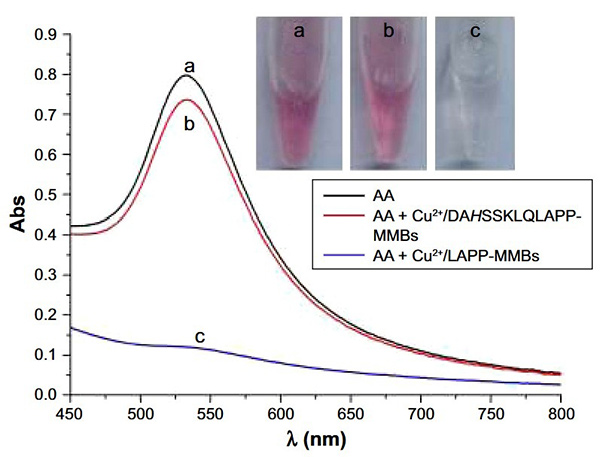
Figure 3. UV–Vis absorption spectra and photographic images (A) of HAuCl4 and CTAC after incubation with different solutions. In curve a, AA (250 µM) was not incubated with Cu2+ and peptide-functionalized MMBs. In curves/tubes b and c, AA (250 µM) was preincubated with the mixture of 1.5 µM Cu2+ and peptide-functionalized MMBs for 30 minutes. (Xia et al., 2018)
Case 2: Fast screening of ligand-protein interactions based on ligand-induced protein stabilization of gold nanoparticles
New et al., 2014. doi:10.1021/ac404241y
A gold nanoparticle (AuNP)-based assay has been developed for high-throughput screening of low molecular weight (LMW) ligands and for assessing ligand-induced protein stabilization, a key step in drug discovery and structural genomics. The method exploits the sensitivity of AuNP aggregation to protein conformational changes, with ligand binding enhancing protein stability and protecting AuNPs from aggregation. Using transcription factors FoxA1 and AP-2γ, human serum albumin, and a library of compounds, the assay identified strong binders and confirmed ligand-induced stabilization. Results were validated with SPR, DSLS, and tryptophan fluorescence. This robust approach provides new opportunities for identifying drug candidates targeting transcription factors in breast cancer therapy.
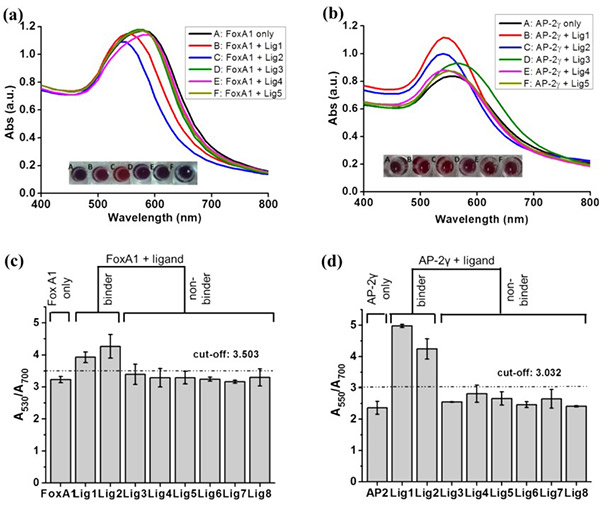
Figure 4. Absorbance spectra of AuNPs incubated with (a) FoxA1-ligand and (b) AP-2γ-ligand solutions at RT in 100 mM NaCl, taken at 10 min upon salt addition. Summary of dispersion status measured for AuNPs with (c) FoxA1-ligand (A530/A700) and (d) AP-2γ-ligand (A550/A700). (New et al., 2014)
Testimonials—Gold Nanoparticle Screening Services
“We worked with Creative BioMart to evaluate the binding affinity of a panel of small molecules to our lead protein target. Their AuNP-based colorimetric assays allowed us to rapidly differentiate high- and low-affinity binders with remarkable sensitivity. The quick turnaround gave our team the confidence to advance three top candidates into preclinical validation, saving us months in our discovery pipeline.”
— Director of R&D | Global Pharmaceutical Company
“Our academic lab collaborated with Creative BioMart to study pH-induced conformational changes in a heat-shock protein. Their conjugated polymer–AuNP platform revealed subtle unfolding transitions that were undetectable with conventional spectroscopic methods. The detailed data not only confirmed our hypotheses but also opened new research avenues into protein stability.”
— Principal Investigator | Leading Research University
“We partnered with Creative BioMart to design a gold nanoparticle–FRET assay for detecting antigen-antibody interactions related to an infectious disease biomarker. The assay delivered clear, reproducible signals with minimal background interference. This robust platform has since become the foundation of our prototype diagnostic kit, which is now undergoing regulatory evaluation.”
— Head of Assay Development | Biotechnology Diagnostics Company
“As part of a high-throughput screening project, we needed a fast and scalable solution for ligand-protein interaction analysis. Creative BioMart’s AuNP-based assays, combined with their SPR validation, provided us with both speed and quantitative accuracy. Their expertise in assay customization helped us evaluate more than 500 ligands within weeks, allowing us to prioritize only the most promising hits for further development.”
— Senior Scientist, Discovery Chemistry | Mid-Sized Biotech
FAQs About Gold Nanoparticle Ligand-Protein Screening
-
Q: What types of interactions can your AuNP-based assays detect?
A: Our gold nanoparticle (AuNP) assays can screen a wide range of biomolecular interactions, including protein-ligand, protein-DNA, small molecule-DNA, and antigen-antibody binding. They are also highly sensitive to environmental conditions, enabling detailed studies of protein conformational changes under pH, temperature, or other stresses. -
Q: How sensitive are your AuNP-based detection methods?
A: AuNP assays are extremely sensitive due to their unique optical properties. Even subtle binding events or structural changes can be detected through aggregation-induced colorimetric shifts, fluorescence-based FRET/NSET signals, or SPR-based kinetic measurements. This allows for early detection of weak or transient interactions. -
Q: Can the assays be customized for my specific protein or ligand?
A: Yes. We specialize in designing custom ligand-coated AuNPs and integrating luminescent conjugated polymers to fit the unique requirements of each project. Whether for drug discovery, diagnostics, or academic research, we tailor the assay parameters to your target system. -
Q: What detection platforms do you offer besides colorimetric assays?
A: In addition to colorimetric detection, we provide fluorescence-based FRET/NSET assays and Surface Plasmon Resonance (SPR) protocols for more detailed kinetic and affinity measurements. This multi-platform approach ensures both rapid screening and quantitative validation. -
Q: What are the advantages of using AuNP-based assays over traditional methods?
A: AuNP-based assays offer:- Higher sensitivity to small structural or environmental changes
- Visual, real-time monitoring through colorimetric detection
- Compatibility with multiplexed screening formats
- Lower sample requirements compared to many traditional methods
- Flexibility in detecting diverse biomolecular interactions
-
Q: Do you provide full data analysis and interpretation?
A: Yes. Our team not only conducts the assays but also provides comprehensive data analysis, including binding affinity calculations, specificity assessments, and recommendations for follow-up validation. Clients receive a detailed report tailored to their research objectives.
Resources
Related Services
Related Products
References:
- New SY, Aung KMM, Lim GL, et al. Fast screening of ligand-protein interactions based on ligand-induced protein stabilization of gold nanoparticles. Anal Chem. 2014;86(5):2361-2370. doi:10.1021/ac404241y
- Sengupta A, Azharuddin M, Al-Otaibi N, Hinkula J. Efficacy and immune response elicited by gold nanoparticle- based nanovaccines against infectious diseases. Vaccines. 2022;10(4):505. doi:10.3390/vaccines10040505
- Xia N, Deng D, Wang Y, Fang C, Li SJ. Gold nanoparticle-based colorimetric method for the detection of prostate-specific antigen. IJN. 2018;13:2521-2530. doi:10.2147/IJN.S154046
Contact us or send an email at for project quotations and more detailed information.
Quick Links
-

Papers’ PMID to Obtain Coupon
Submit Now -

Refer Friends & New Lab Start-up Promotions

